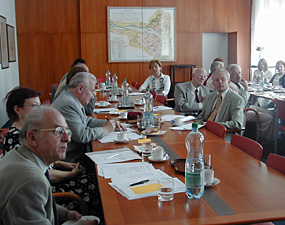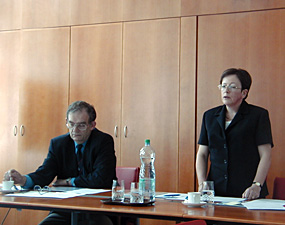From the communist putsch in February 1948 until the end of 1989, academic libraries in the Czech Republic (formerly Czechoslovakia) were little-recognized parts of their universities. Usually situated in unsatisfactory spaces, libraries were provided with insufficient budgets and served as textbook lending offices. Access to current scientific information and knowledge was very limited – for financial and ideological reasons.
After the Velvet Revolution in 1989, universities and their libraries were finally given the opportunity to develop freely and dynamically. In 1990 the Higher Education Act was passed, providing academic freedom, especially the right to do research and teach without restraints. Government funding for universities increased during the mid 1990s. The Council of Universities was established and, in early 1994, the Committee for Academic Libraries came into existence as a part of the Council. Representatives of academic libraries (most of them library directors) participated on the Committee. The main objectives of the Committee were to automate and computerize libraries, to implement modern library services, to support continuous education for librarians, and to introduce new forms of user education. In order to reach these goals, informal working groups were established specializing on particular issues. A new listserv was founded to improve communication between librarians. The work of the Committee has been summarized each year during the Czech University Libraries Annual Meeting.
The Committee initiated several activities during the 1990s that have helped many libraries to minimize the gap caused by lack of financing and 40 years of isolation from developed western countries. It has also been successful when negotiating with foundations and grant agencies to open additional funding opportunities to academic libraries. Many research and development issues pertinent to academic libraries were included among funding priorities, and writing grant proposals and working on projects became an essential part of academic librarians’ everyday work. The Committee has also initiated several consortia in order to gain access to electronic databases for as many academic institutions as possible. Finally, the Committee served as a platform for integrative efforts, cooperation and sharing best practices.
In the late 1990s it became obvious that the Committee needed to be institutionalized in order to gain more influence and to undertake other activities. The first ideas about establishing the Association of Libraries of Czech Universities (ALCU) as a common platform for Czech academic libraries emerged at that time. Primarily, establishing the association would help libraries to step out of their dependent position within universities and share common interests and efforts. In 2001 this idea reached its final phase and led to distinctive support among Czech university administrators.


On June 13th 2002 the constitutive meeting was held. Twenty-one out of 24 Czech universities existing at that time became the constituent members. As of June 2006, ALCU had 23 institutional members out of 25 public universities established in the Czech Republic.